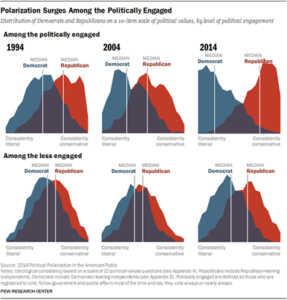
Science Friday: Who Enters Politics and Why?
Most interesting research questions begin with a real life problem.
A general political consultant we work with wanted to target digital ads to ‘people who are thinking about running for office.’ This is what we do – we build data driven audiences for people to connect with using various media.
So the question is “What type of insane people run for political office and why?” If we could better answer this question, we could build a rock solid digital media audience to target for this political consultant.
While we do not yet have the ability to read people’s minds as to their political ambition, we start by asking who has done research in this area. At times, the world aligns and you find a good paper that has done just that – reviewed the literature for you.
Dr. Gulzar, from Stanford, does a review of the literature – using comparative data and US data.
This paper presents the difficulty of such a “simple question.”
“Who runs for office and why?” is difficult to even conceptualize and attempting to delve into the ‘whys’ illustrates how completely messy human behavior is.
In addition, this paper doesn’t begin to delve into potential difference between candidates in the hyper-polarized parties and voters in the US.
At Ozean, when we begin an analysis for a potential political candidate there are three main areas we look at: political, environment and then and only then do we look specifically at the candidate.
- What are the political considerations? This is where we take a look at the rules, the political calendar, the district or political boundaries, the historical returns, the political media environment. Items that are constant over time in this district, state.
- What is the current political enviroment? This is where we look at district composition, incumbency, current polling information, the national political enviroment, where the party is in recruitment process, what additional items are on the same ballot, who else may be in the race from the same party, who else may be in the race from the competiting party, and potential shifts from considerations observed in first phase. (example – is there a pending change in political boundaries?)
- Candidate Traits. This is the difficult one because depending on 1 and / or 2, specific candidate traits may be irrelevant. As the old saying goes, the district may pick the representative. However, assuming 1 & 2 are favorable, what traits make a successful candidate? Because we have seen in close election after close election, candidates do matter.
But even that progression shows the difficulty in reviewing this literature. My conceptualization above is more in line with asking “What makes a successful candidate?” not “Who runs for office?” Two very different questions.
The research does a good job of exploring the challenge of “unseen candidates”. These are the candidates that seriously consider a run and don’t declare for whatever reason.
The research attempts to classify three determinants – individual, group, and institutional.
On the individual front, Black is quoted as saying an individual will consider the probability of winning * the benefit of winning – Cost. Is that net benefit higher than other options? Like any models this is very simplistic, and I think assumes way too much rationality in the decision making process. The model completly ignores some of the most important individual traits – the least of them being EGO.
In addition, the author explores the insitutional factors – primarily party recruitment and allocation and steering of resources.
Another group or instutional factors is one that I despise, but it is a reality – dynastic political families –name ID and political networks mean a lot in this game, and much to my chagrin, kids are able to plug into or grew up in these networks.
Finally, a final instutional factor is the rules. Filing fees, timeframes, Hatch Act considerations…etc. The rules of the game – especially when it comes to ballot access – matter a lot in politics.
The author then explores political competency and asks is there a trade off between political competency and political representation. Said another way, should the elite (weathy, highly educated (so many lawyers), leadership skills) rule us? Should they rule us when they are significantly different than the district’s citizens? It is an interesting section, but doesn’t really bring us closer to answering the pivotal question – “Who Runs for Office?”
Well, in this review of the literature – the author admits in the last paragraph – we really don’t have good data on this.
“While researchers often focus on work on political entry or leadership that has a formal political flavor, more work is needed on the antecedents of political entry. What activities and jobs increase the likelihood of future participation in politics as a politician? Tracing the pipeline of political entry before it formally occurs could provide insights into how the political class may be broadened, for instance.”
CONCLUSION
While the review of the literature is informative and an relatively easy read, it does shed a light on that fact that we don’t really have great data on who runs for office.
I think some of the more interesting work mentioned in the paper is a new line of research being inspired by Dal Bó et al. They explored Sweden, but they are attempting to look at individual variables, and I think that has promise. If you have been in this business, you know there is a ‘type.’ and I would like to see more work done defining the individual traits of those that raise their hand and offer themselves for public service.



